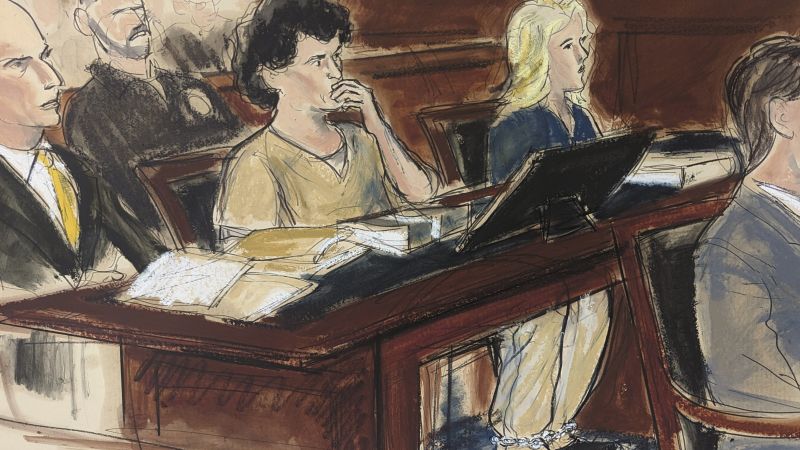A version of this story first appeared in CNN Business’ Before the Bell newsletter. Not a subscriber? You can sign up right here. You can listen to an audio version of the newsletter by clicking the same link.
Sam Bankman-Fried was sentenced to 25 years in prison last week for defrauding customers and investors in his failed crypto exchange FTX. He was also ordered to repay more than $11 billion, a sentence that will likely financially incapacitate him for the rest of his life.
Securing compensation for victims of such white-collar crimes can drag out for years. Still, that’s what Zach Bruch is trying to do.
Bruch is one of the largest individual FTX creditors and has been tapped by the US Department of Justice to serve as one of nine on the FTX Creditors’ Committee, where he is working to recoup the funds lost by customers.
DOJ-appointed creditor committees ordinarily consist of people and companies who hold the seven largest unsecured claims against the debtor (in this case, FTX), according to the agency.
Bruch, a veteran of the crypto world, also publicly debuted his startup crypto casino last week. MyPrize has a valuation of $140 million with investments from Dragonfly, Mechanism Capital, Arrington Capital, and a16z Scout.
Before the Bell spoke with Bruch about Sam Bankman-Fried, FTX, MyPrize and the future of crypto.
This interview has been edited for length and clarity.
Before the Bell: Sam Bankman Fried was sentenced to 25 years in prison last week. Do you feel like justice was served?
Zach Bruch: [More than one million] people were impacted by Sam’s actions — financially, emotionally, and otherwise. No number of years will ever make up for that. I feel for all of the creditors and am doing everything I can to help recoup what was taken from us.
How did the collapse of FTX impact you?
On that day I had a massive root canal, it was multiple root canals. I came home and was in a lot of pain, I couldn’t speak. Then I get a phone call basically saying “hey, I think there are withdrawal problems on FTX, you should try to see if you can get your money out.” I immediately stumbled my way over, with a painful mouth, to my computer and tried to withdraw. Of course I could not withdraw anything.
I immediately sprung into action, calling my lawyers and seeing if there was anything that could be done. But there was nothing to be done. Like any trade, I understood that there’s risks, and I knew I just had to move forward. I needed to make sure that we were going to find the best recovery possible, not just for myself, but for every single creditor. So when the Department of Justice asked me to sit on the FTX Creditors’ Committee, I knew it was something I wanted to do. I want to do whatever I can to try to make sure that we have the best recovery possible for every single creditor and see if we can make everybody whole.
There’s been chatter about how Sam Bankman Fried’s defense claimed the FTX customer losses were “zero” because the estate says it’s confident it can make customers whole. How do you respond to that?
From my own perspective, the goal is to make sure that every customer gets back everything that they lost on the exchange. But no customer is going to get back the time or the agony and pain that they might have felt because, you know, it doesn’t matter what their financial situations were, they were victims. Everyone that was stolen from was a victim, and it was a terrible thing that happened.
Bitcoin recently crossed the $70,000 mark, and some analysts are moving their price targets to $83,000. Is the crypto winter is officially over? What comes next?
When I think about the broader crypto markets, I’m looking a lot further ahead, not just two weeks ahead and not just six months ahead. I’ve been in this space since 2010, and I’ve seen a massive growth in this industry. I think more and more people are going to participate, more people are seeing the value in crypto and seeing the value and having exposure to the space.
Tell me about your new online gambling venture – MyPrize. Are you a gambler yourself?
I’m definitely a big risk taker. I’ve worked at some of the largest crypto trading desks in the world and then also started trading my own book of capital and grew to become one of the largest individual crypto traders. I’ve always been building in this risk management space. So when I was looking more broadly at the gambling and gaming industry, I saw that it’s a trillion-dollar market and less than $100 billion sits online.
I knew that myself and my team could get together and really build an engaging product, because it has a lot of similarities to crypto exchanges and trading desks. You have to manage risk appropriately, you have to have user accounts, you have to think about money laundering and fraud risk and compliance. These are all things that we’ve done in very high-stigma industries like crypto. Gambling has a similar type of stigma.
I think over the next three to five years, you’re going to see a lot more online gambling.
The latest US inflation report showed that rising prices continue to weigh on American consumers, reports my colleague Elisabeth Buchwald.
The Federal Reserve’s preferred inflation gauge, the Personal Consumption Expenditures price index, was up 2.5% for the 12 months that ended in February, a faster pace than January’s 2.4% rise in prices. However, it was in line with FactSet consensus estimates.
Driving the increase in the annual inflation rate was a 2.3% jump last month in energy prices.
The Commerce Department data released Friday means the Fed is even further from achieving its goal of 2% inflation. But Fed Chair Jerome Powell wasn’t fretting about it.
The data was “pretty much in line with our expectations,” Powell said Friday at an event hosted by the San Francisco Fed. He added that it’s generally good when data aligns with the central bank’s forecasts.
The latest inflation data is unlikely to shift the Fed’s plans for eventually cutting interest rates.
Central bankers including Powell have signaled that achieving 2% inflation will be a bumpy path.
Fed Gov. Christopher Waller emphasized that in a speech he gave earlier this week titled “There’s Still No Rush.”
Recent inflation readings, he said, tell him that “it is prudent to hold this rate at its current restrictive stance perhaps for longer than previously thought to help keep inflation on a sustainable trajectory toward 2%.”
Fed officials continued to pencil in three rate cuts this year. Investors anticipate the first of those three will come in June.
Six journalists working for independent media outlets in Russia were arrested in a span of just a few hours this week on the eve of the anniversary of American reporter Evan Gershkovich’s detention in the city of Yekaterinburg, report my CNN colleagues Radina Gigova, Anna Chernova and Olesya Dmitracova.
The journalists include Antonina Favorskaya, who covered the late Russian opposition leader Alexey Navalny, Reporters Without Borders (RSF) said Thursday.
Favorskaya, who works for the independent Russian media outlet SOTA Vision, is accused of “extremist activities” because of her coverage of Navalny and his work, the media freedom organization said in a statement.
On Friday, Gershkovich marked the grim milestone of one year in Russian detention. Shortly after his arrest, the Wall Street Journal reporter was charged with espionage — an accusation vehemently denied by Gershkovich, his employer and the US government.
He was the first journalist to be arrested on such charges since the Cold War, and the Russian government has yet to provide any evidence to support its claim.
Read the full article here




